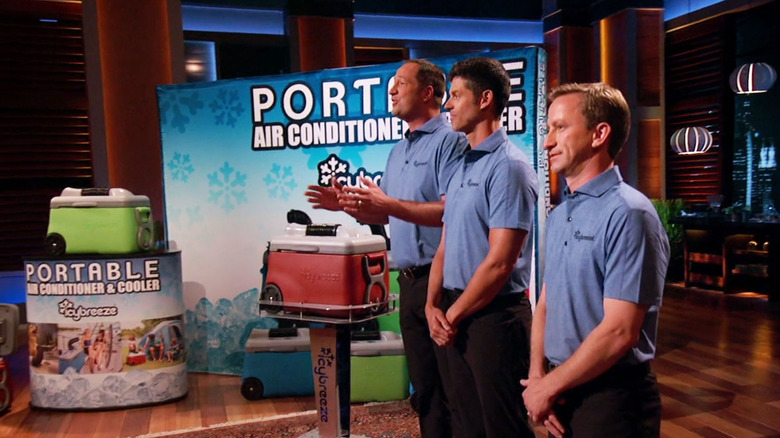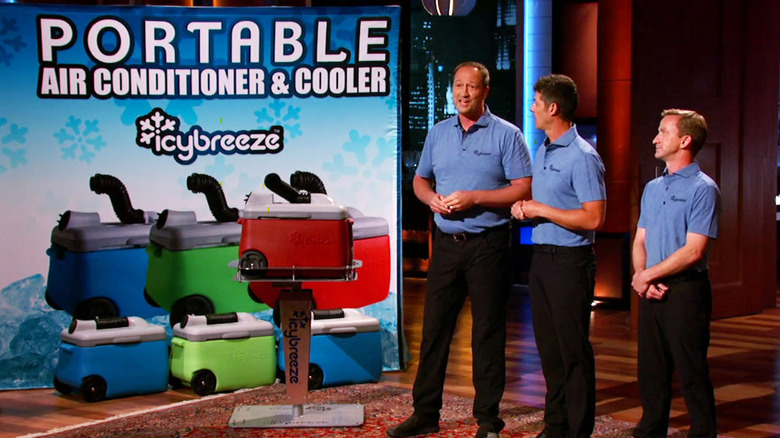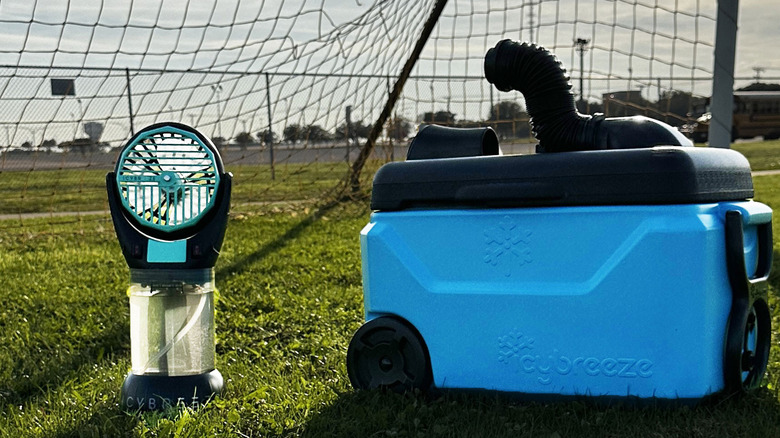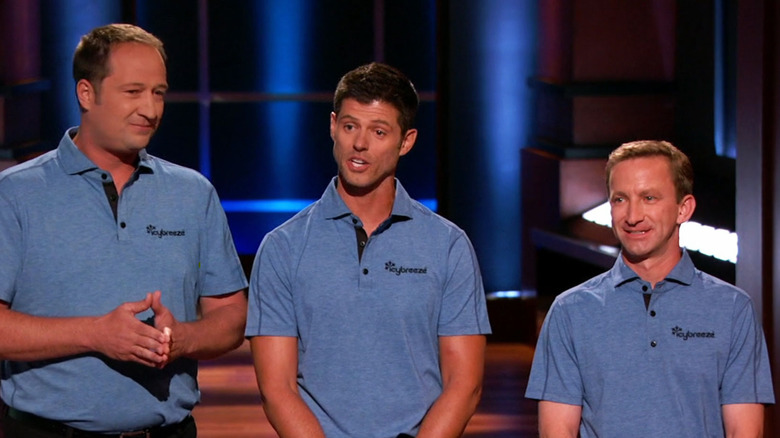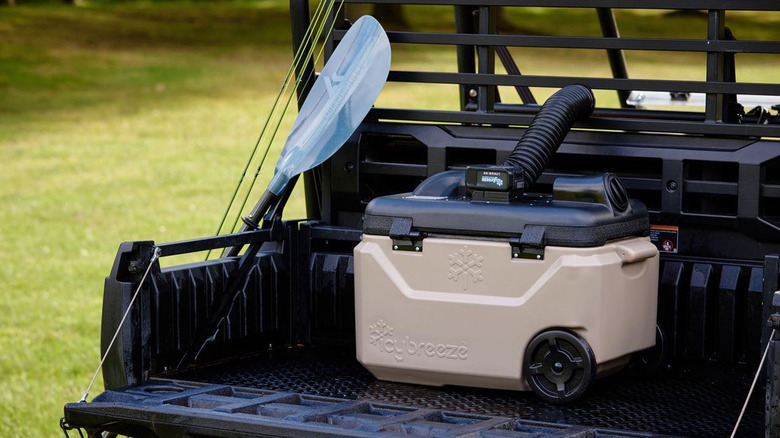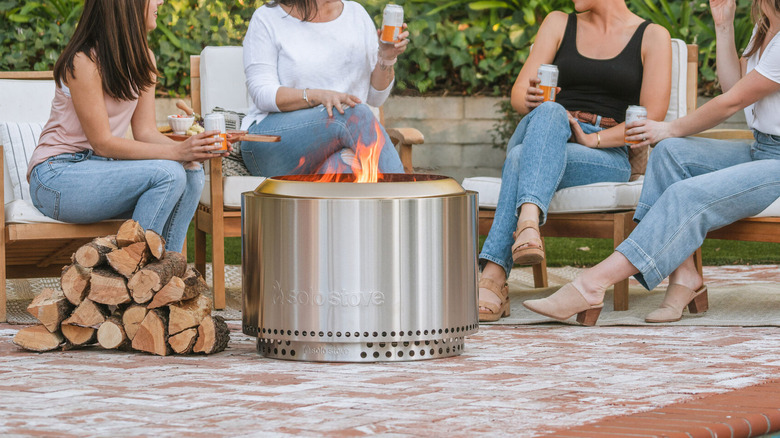What Happened To IcyBreeze From Shark Tank Season 7?
We may receive a commission on purchases made from links.
While some people watch "Shark Tank" to watch a group of rich business owners rip apart absurd ideas, occasionally, a good idea makes it through, at least upon initial impressions. IcyBreeze, a company that boasted an inventive cooler that was also a personal AC unit, was one such creation that graced the show on Season 7.
In all the strange inventions featured on "Shark Tank," IcyBreeze seemed within the realm of reality. In theory, it solved a real problem for many people who camp or do outdoor activities. The concept was simple enough. People who enjoy the outdoors often need to use coolers to pack drinks and food, so why not take the cold air generated and use it as a portable, personal AC unit?
Though the company would fail to secure funding during its episode, the story of IcyBreeze is actually an interesting success, fueled by one founder with a very interesting background.
What happened to IcyBreeze on Shark Tank?
IcyBreeze's executive team of Jason Shackleford, Dave Yonce, and Andrew Jenkins appeared on "Shark Tank" during Season 7 Episode 15. They pitched their cooler and air conditioner to the Sharks, with an ask of $50,000 for a 5% stake in their company, putting the valuation of IcyBreeze at a cool $1 million.
Shackleford would explain how the product worked. IcyBreeze coolers would pump the cold water at the bottom of the cooler into a brass radiator, which would feed into a fan that would blow cold air out of a hose at the top of the cooler. This tech would create a cooling breeze 35 degrees Fahrenheit lower than the ambient temperature.
Sadly, cracks in the company would immediately start to form as the Sharks dug into the numbers. First, the coolers would cost an eye-watering $349 per cooler, substantially higher than the market average. Worse yet, the coolers cost $191 to manufacture, leaving little room for margin after distribution and other essential costs. Ultimately, the Sharks were unable to reach a deal with the eager entrepreneurs.
IcyBreeze continued to sell coolers after the show
Even though the team at IcyBreeze was unable to obtain the strategic partnership they had desired, it wasn't a loss for the company by a longshot. IcyBreeze continued to sell their cooler/AC units after the show. Though it's unknown whether they ever reached their goal of $2.5 million in sales immediately following the airing, the company would continue to persist years after the episode debuted in 2016.
IcyBreeze coolers are still available, with their latest models of the IcyBreeze V2 Pro costing $289.99 for the base model and the IcyBreeze Platinum coming in at $339.99. Today, the company operates out of its Sweetwater, Texas, location. As it was when the show aired, it seems like the product is sold almost exclusively on the IcyBreeze website.
Interestingly, it also appears that there are now-defunct IcyBreeze product pages for the coolers that received middling reviews on Amazon, indicating that they once were sold there as well.
What happened to the IcyBreeze founders?
During the "Shark Tank" episode, it was revealed that one of the founders, Dave Yonce, was a founder of SolarWinds, a software and IT company that's now publically traded on the stock market with a market capitalization of over $2 billion. The same SolarWinds was involved in a 2020 Microsoft hack that would impact several government agencies.
Yonce had personally invested over $5 million of his own money into IcyBreeze, which would cause the Sharks to question the intentions of the business owners even coming onto the show. He'd explain he was looking for a strategic partnership more than critical funding.
After the show, it appears as if two of the three original founders would eventually step away from the company. Andrew Jenkins departed as Co-CEO in January of 2016, which — interestingly enough, was also the same month that the IcyBreeze segment aired on "Shark Tank." Jason Shackleford would also leave the organization as CEO in December 2017 to move on to other endeavors.
Though unconfirmed, Dave Yonce likely stayed involved with the company for some time, though he tends to keep a low profile. Today, IcyBreeze's CEO and President is John Brinkman, and it remains uncertain whether Yonce is still involved.
IcyBreeze received funding from Sweetwater, Texas
According to reporting from the Sweetwater Reporter, IcyBreeze eventually secured the funding it needed, even though it couldn't land a deal on "Shark Tank." The Sweetwater Economic Development's Board of Directors entered into a five-year incentive agreement for a maximum of $275,000 to encourage the company's growth.
The goal? To bring more jobs to Sweetwater, Texas — as the agreement was structured as an incentive of $3,000 for every new full-time position created. As of January 2023, IcyBreeze employs 32 people out of their Texas location. The reporting also goes on to mention that since 2018, IcyBreeze has increased its sales by an average of 174% every year, including the years in which the COVID pandemic gripped the world.
As a result, IcyBreeze has expanded its operations to a 50,000-square-foot facility to accommodate the extra business. While all this is amazing for the company, it's not the end of its success.
IcyBreeze was acquired by Solo Brands in 2023
On July 1, 2023, IcyBreeze Cooling was acquired by Solo Brands, a publically traded company with a $559.64 million market cap. Known for a host of outdoor equipment, Solo is best known for its portable firepits. The Solo Stove is the company's portable smokeless stove made for backpacking and camping.
Solo is also known for its apparel and activewear brand, Chubbies, and owns Oru Kayak, a company specializing in manufacturing folding kayaks, which, interestingly enough, was also featured on "Shark Tank."
In a Q3 2023 Solo Brands earnings call, John Merris, the CEO of Solo Brands, outlined more details on why the massive company acquired IcyBreeze. Merris would explain that IcyBreeze — or at least the technology that fuels it — integrates nicely with Solo's own product, the Solo Stove. The company plans to integrate IcyBreeze into the Solo Stove in 2024, making the IcyBreeze a more viable gift even when it's out of season.
